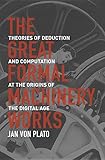The great formal machinery works : theories of deduction and computation at the origins of the digital age / Jan von Plato.
By: Von Plato, Jan [author.] .
.
Material type:  BookPublisher: Princeton, New Jersey ; Woodstock, Oxfordshire : Princeton University Press, [2017]Description: 1 online resource (viii, 377 pages) : illustrations.Content type: text Media type: computer Carrier type: online resourceISBN: 9781400885039; 1400885035; 0691174172; 9780691174174.Subject(s): Information technology -- History
BookPublisher: Princeton, New Jersey ; Woodstock, Oxfordshire : Princeton University Press, [2017]Description: 1 online resource (viii, 377 pages) : illustrations.Content type: text Media type: computer Carrier type: online resourceISBN: 9781400885039; 1400885035; 0691174172; 9780691174174.Subject(s): Information technology -- HistoryIncludes bibliographical references and index.
An ancient tradition -- The emergence of foundational study -- The algebraic tradition of logic -- Frege's discovery of formal reasoning -- Russell : adding quantifiers to Peano's logic -- The point of constructivity -- The G�ottingers -- G�odel's theorem : an end and a beginning -- The perfection of pure logic -- The problem of consistency.
The information age owes its existence to a little-known but crucial development, the theoretical study of logic and the foundations of mathematics. The Great Formal Machinery Works draws on original sources and rare archival materials to trace the history of the theories of deduction and computation that laid the logical foundations for the digital revolution. Jan von Plato examines the contributions of figures such as Aristotle; the nineteenth-century German polymath Hermann Grassmann; George Boole, whose Boolean logic would prove essential to programming languages and computing; Ernst Schr�oder, best known for his work on algebraic logic; and Giuseppe Peano, cofounder of mathematical logic. Von Plato shows how the idea of a formal proof in mathematics emerged gradually in the second half of the nineteenth century, hand in hand with the notion of a formal process of computation. A turning point was reached by 1930, when Kurt G�odel conceived his celebrated incompleteness theorems. They were an enormous boost to the study of formal languages and computability, which were brought to perfection by the end of the 1930s with precise theories of formal languages and formal deduction and parallel theories of algorithmic computability. Von Plato describes how the first theoretical ideas of a computer soon emerged in the work of Alan Turing in 1936 and John von Neumann some years later.
Vendor-supplied metadata.
In English.
IEEE IEEE Xplore Princeton University Press eBooks Library


There are no comments for this item.